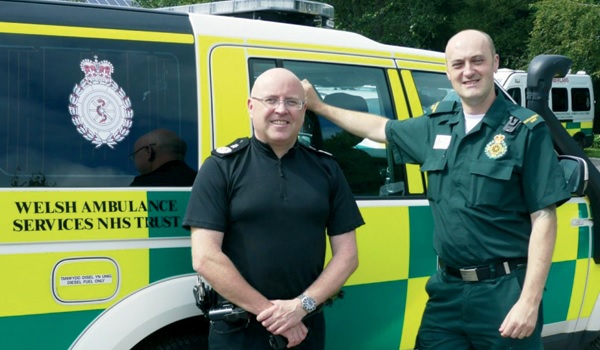Joint response unit frees up resources
A joint response unit (JRU) being piloted by Gwent Police and the Welsh Ambulance Service is helping to save lives while freeing-up resources. Under the new initiative, a paramedic and a Special Constable in a specially marked Land Rover carry out shifts covering the Aneurin Bevan Health Board area, self-selecting appropriate 999 incidents via remote access to calls coming into local control rooms.
A joint response unit (JRU) being piloted by Gwent Police and the Welsh Ambulance Service is helping to save lives while freeing-up resources. Under the new initiative, a paramedic and a Special Constable in a specially marked Land Rover carry out shifts covering the Aneurin Bevan Health Board area, self-selecting appropriate 999 incidents via remote access to calls coming into local control rooms.
During its first month, members of the response unit attended 72 incidents and required back up from an emergency ambulance on only 15 occasions, while the Trusts Urgent Care Service also provided support five times.
This enabled ambulance crews who would normally have attended to respond to members of the public facing potentially life-threatening emergencies elsewhere in the region.
It also meant that police officers at the scene received support from a Special Constable and were freed up to move on to other cases by not having to wait for an ambulance to be allocated.
The JRU was launched after it was found that between October 2015 and March 2016, the two emergency services attended 2,249 incidents together.
Explaining the typical type of incident that the unit responds to and how they are allocated, Chris Hughes, JRU project lead at the Welsh Ambulance Service, said: All of the polices workload is passed through the radio so, for example, say if they were asking any units to attend a car accident in Blackwood then our ears prick up and we can start making our way.
We attend lots of RTCs (road traffic collisions) as we have the information live and what were doing is updating both the ambulance and police control rooms, so they already have the job open from us and know theyve already got someone en route.
Its good for us as weve got the Special Constable there who can man the police radio, who knows the terminology, and can help us to communicate with police officers at the scene of incidents.
He explained how one weekend they had a man who was stabbed in the throat.
It turned out it wasnt life-threatening, but the potential for that was that it could have been highly life-threatening, said Mr Hughes.
Within four minutes we were on scene and normally; if that had come from the police sergeant on scene, by the time the information had been passed on to police control then to ambulance control and on to a vehicle it could have taken much longer.
Mr Hughes, who leads and is part of a team of four paramedics with the unit, decided to pursue the initiative after witnessing a similar operation involving the London Ambulance Service, in collaboration with the Metropolitan Police Service.
Currently, the Gwent JRU works three 12-hour shifts per week on a Friday, Saturday and Sunday, when the emergency services often experience their highest demand.
Once the pilot is completed next month, its success will then be evaluated.
Mr Hughes said: We would normally have run 72 emergency ambulances to those incidents in July, but as a result only 15 were needed, so 57 emergency ambulances over 14 shifts were left available for the community in order to attend medical emergencies.
The police are noticing a reduction in lost hours on scene, so were freeing-up police officers who are in high demand on the weekend.
They might only be waiting ten minutes for us so when we get there, as long as the scene is safe and secure to work in, the police officers can leave there and go to other incidents leaving myself and the special officer at the scene so they still have a police presence.
They will obviously stay if there was a concern for our safety or for somebody to go to custody.
Its not the particular job were going to, but the availability were freeing-up for the police and ambulance services.
Chief Inspector Nick McLain from Gwent Police said: Partnership working is at the cornerstone of everything we do and allows us to provide an enhanced service to people in need.
On completion of this pilot, we will be in a position to evaluate the


